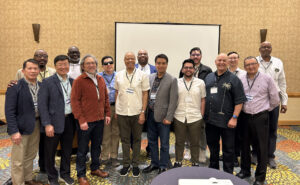
Updated: Corrects percentage in second paragraph to 59 percent
MADISON, Wis. (BP)–Supporters of traditional marriage gained a big legal win at the Wisconsin Supreme Court June 30, although both sides in the nationwide struggle over marriage’s definition now are watching Hawaii and California, two states where the next round of political and legal battles will take place.
The Wisconsin Supreme Court unanimously ruled that the state’s constitutional marriage amendment, approved by 59 percent of voters in 2006, does not violate the state constitution’s two-subject ban. Opponents argued that because the amendment prohibited both “gay marriage” and same-sex civil unions, it was unconstitutional. But the court, in a 7-0 ruling, disagreed.
“Both sentences of the marriage amendment relate to marriage and tend to effect or carry out the same general purpose of preserving the legal status of marriage in Wisconsin as between only one man and one woman,” the court ruled.
The suit was filed by William McConkey, a University of Wisconsin-Oshkosh political science instructor. Wisconsin is among the states whose constitutions prevent amendments that are placed before voters from dealing with more than one subject. Similar lawsuits in Arizona, Florida, Georgia and Louisiana have failed. Thirty states have marriage amendments, although not all of them prohibit civil unions.
“The lawsuit’s accusation that the marriage amendment addresses multiple subjects was just a sneaky attempt to tear down what the voters clearly wanted,” Wisconsin Family Council President Julaine K. Appling said in a statement. “The court was right to reject this baseless lawsuit. Judges and politicians should never toss aside the will of the people in order to impose a system that intentionally deprives children of a mom and dad. Which parent doesn’t matter: a mom or a dad?”
In Hawaii, Republican Gov. Linda Lingle has until Tuesday, July 6, to make her decision on a bill that would legalize civil unions in the state. She could either sign, veto or let the bill become law without her signature. The bill, H.B. 444, would grant the legal benefits of marriage to same-sex couples. Hawaii law requires the governor to provide at least 10 days notice to the legislature on bills she might veto, and H.B. 444 was on the list submitted June 21. The state senate apparently has the votes to override a veto, although the House likely is several votes short. But despite the bill being on the list, she could still sign it.
As of June 21 she had received around 20,000 letters, e-mails and phone calls, most of them opposed to the bill, according to the Associated Press.
“I can tell you that throughout this process, I’ve gone back and forth,” Lingle said.
In California, a federal judge, Vaughn Walker, is expected to issue a decision this summer in a high-profile case that — if it makes its way to the U.S. Supreme Court — could make “gay marriage” the law of the land. The lawsuit seeks to overturn California’s marriage amendment, known as Prop 8. The trial concluded in June.
–30–
Michael Foust is an assistant editor of Baptist Press.
















